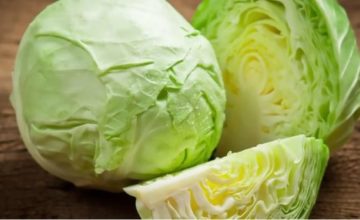
Cabbage is among the most popular cruciferous vegetables. It is densely packed with nutrients, including vital minerals and vitamins.
This vegetable is available in a variety of colors, and its leaves can either be shriveled or smooth.
Cabbage contains four major antioxidants. These are choline, beta-carotene, lutein, and quercetin. Choline can improve memory and fight inflammation. It can also prevent neural tube defects in pregnant women.
Beta-carotene protects the human DNA from the ill effects of smoking. Lutein can prevent age-related macular degeneration while quercetin fights harmful bacteria and combats disease.
Cabbage is rich in various antioxidants, including anthocyanins and sulforaphane. These help fight inflammation and the associated ailments like heart disease and cancer. Fermented forms of cabbage may also boost your digestive health.
No matter the variety, the benefits are similar. Below are five health benefits of cabbage:
1. May enhance digestive health
Kimchi, another fermented food prepared from cabbage, can promote digestive health. It is rich in probiotics and promotes digestive health in ways similar to yogurt and other dairy products. Kimchi prevents constipation and also promotes colorectal health.
Cabbage is also rich in both insoluble and soluble fibers. The former adds bulk to stools and promotes regularity. The latter promotes gut-friendly bacteria.
2. May fight inflammation
Though inflammation by itself is not bad, chronic inflammation is. Cruciferous veggies, like cabbage, fight chronic inflammation.
In a study, women who had the highest intake of cruciferous vegetables displayed the lowest levels of inflammation. The study partly links the intake of such vegetables to reduced inflammation. This can be attributed to an antioxidant called sulforaphane present in cruciferous vegetables. Sulforaphane may also slow down cartilage damage in joints.
Cabbage phytochemicals can also help fight health problems related to inflammation, including cancer and coronary artery disease (clogged Arteries).
3. May aid diabetes treatment
Red cabbage has antihyperglycemic properties, which can cut the risk of diabetic nephropathy. Red cabbage extract also shows promise in alleviating diabetes and its vascular complications.
In a study, oral administration of cabbage extracts lowered blood sugar levels in fasting rabbits and relieved diabetic symptoms in depancreatized dogs.
The anthocyanins in cabbage could also have a role in treating (and even preventing) diabetes.
4. May promote vision health
The lutein in cabbage contributes to vision health. Lutein (along with another antioxidant called zeaxanthin) protects the retina and the lens against the ultraviolet light. Cabbage also contains trace amounts of zeaxanthin.
Cabbage also contains vitamin C, another nutrient that aids vision. It may regenerate vitamin E inside the eye, which is an antioxidant important for vision health.
5. May strengthen immunity
The vitamin C in cabbage could strengthen immunity, though more studies are needed to further validate this statement. The antioxidant stimulates the white blood cells that help form the first line of defense. It also promotes the maturation of T-cells, which are an important component of the body’s immune system.
6. May help with weight loss
Fruits and vegetables containing fiber (including cabbage) can help with weight loss. Some individuals also believe in a particular weight loss diet made of cabbages, called the cabbage soup diet.
This diet involves the intake of large amounts of cabbage soup for seven days. You may also consume certain other fruits and veggies, brown rice, chicken, and beef.
Though proponents say it is a good way to lose a few pounds quickly, you shouldn’t be staying on it for more than a week because it lacks in complex carbohydrates, protein, and other vitamins and minerals.
7. May improve skin health
Cabbage is rich in vitamin C. This nutrient boosts the production of collagen, a structural protein that helps with skin formation and wound healing.
As per mice studies, red cabbage may also have a role in preventing skin cancer.



